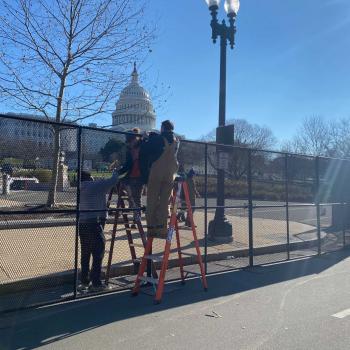Thabiti Anyabwile tries to persuade readers that reparations in the United States for slavery could be biblical. His own definition is straightforward:
I would define reparations as “material and social repayment made as acknowledgement and restitution by an offending party to an aggrieved party for wrong(s) done in order to repair the injuries, losses and/or disadvantages caused by the wrong.” Though these are my own words, I have in mind the work of William “Sandy” Darity at Duke University, who argues that reparations should have three aims: (a) acknowledgement of the wrongs done, (b) payment for the wrongs done, and (c) closure for both parties.
Anyabwile then uses the Old Testament case of the Persian king, Darius, who practiced a form of reparations when the Israelites returned from Babylonian captivity:
In Ezra 6:6-12, King Darius—a king who wasn’t even born when Israel was conquered ruling over an empire that wasn’t even in existence when the exile began—passed a law decreeing that taxes be paid by people who did not conquer or abuse Israel in order to restore Israelites who themselves were not alive during the Babylonian conquest of Israel.
Darius decreed, “The cost [of rebuilding the house of God] is to be paid to these men in full and without delay from the royal revenue, the tribute of the province from Beyond the River” (Ezra 6:8). In fact, those citizens “from Beyond the River” were themselves a people who were at some point conquered and swallowed up by the empire. In other words, Darius, as head of state, compels his citizens through taxes to pay a reparation to Israel even though those citizens did not commit the offense and those Israelites did not directly suffer the offense. What had been stolen was returned and then some as the province was commanded to give “whatever is needed” to restore temple worship and offerings “day by day without fail” (v. 9).
So it seems to me that the “innocence,” “unharmed” and “generational tax” objections all fail in this historical example. If God, who is just and only does justice, has acted in this way then it cannot be unjust for nation-states to voluntarily repay its own citizens for crimes suffered at its hands—no matter when the crimes occurred.
Whether Darius acknowledged wrongs done to God’s people is a thorny question since God ordained the Babylonian captivity of Jerusalem. It’s sort of hard to say that meting out God’s condemnation of a people who broke his law is unjust. Also debatable is whether this was compensation for wrongs done by the Persians, or a form of welfare to assist a people relocating to their homeland.
But the bigger question is the eye-for-eye, tooth-for-tooth character of Old Testament justice. Sometimes making reparations in the Old Testament involved executions. That is certainly what seemed to occur in 2 Samuel 21 where David responds to the injustices of his predecessor, Saul, against the Gibeonites:
Now there was a famine in the days of David for three years, year after year. And David sought the face of the Lord. And the Lord said, “There is bloodguilt on Saul and on his house, because he put the Gibeonites to death.” 2 So the king called the Gibeonites and spoke to them. Now the Gibeonites were not of the people of Israel but of the remnant of the Amorites. Although the people of Israel had sworn to spare them, Saul had sought to strike them down in his zeal for the people of Israel and Judah. 3 And David said to the Gibeonites, “What shall I do for you? And how shall I make atonement, that you may bless the heritage of the Lord?” 4 The Gibeonites said to him, “It is not a matter of silver or gold between us and Saul or his house; neither is it for us to put any man to death in Israel.” And he said, “What do you say that I shall do for you?” 5 They said to the king, “The man who consumed us and planned to destroy us, so that we should have no place in all the territory of Israel, 6 let seven of his sons be given to us, so that we may hang them before the Lord at Gibeah of Saul, the chosen of the Lord.” And the king said, “I will give them.”
7 But the king spared Mephibosheth, the son of Saul’s son Jonathan, because of the oath of the Lord that was between them, between David and Jonathan the son of Saul. 8 The king took the two sons of Rizpah the daughter of Aiah, whom she bore to Saul, Armoni and Mephibosheth; and the five sons of Merab the daughter of Saul, whom she bore to Adriel the son of Barzillai the Meholathite; 9 and he gave them into the hands of the Gibeonites, and they hanged them on the mountain before the Lord, and the seven of them perished together. They were put to death in the first days of harvest, at the beginning of barley harvest.
Ouch!
I can well imagine why Anyabwile would not want to use this example in his argument for reparations. But it’s hard to see how this passage does not apply.















